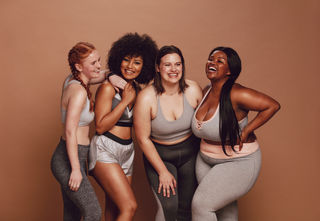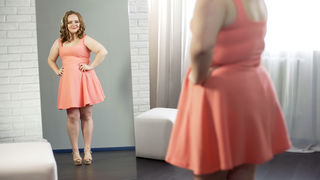
Body Positivity
Body Positivity: It’s Here, It’s Now, but What Does It Mean?
Do you think "body positivity" is just a trendy catchphrase? Think again.
Posted February 18, 2020 Reviewed by Davia Sills

Recently, “body positivity” seems to be everywhere. The term is generally understood to mean confidence in and acceptance of one’s own body, despite the narrow vision of what our culture constantly shows us is desirable or acceptable.
When Time Magazine named pop singer Lizzo as its Entertainer of the Year in 2019, it was because, as writer Samantha Irby said, “Lizzo was a beam of light shining through doom and gloom, telling us to love ourselves even if the world doesn’t always love us back. We needed her.”
For those who don’t follow pop music and culture, Lizzo is a young African American woman of generous proportions with immense musical talent, joy, and a strong message of self-acceptance. She dances in skimpy spandex bodysuits and has no problems being photographed in bikinis or partially naked. She even wore a dress with her rear on display to an L.A. Lakers game that caused a lot of controversy. She’s also gotten attention for proudly wearing a natural hairstyle—a confident statement amidst pressure on African-American celebrities and professionals to hide their natural curls through straighteners and wigs.
But she is certainly not the only person challenging conventional ideas of beauty and body ideals. In the last year especially, it seems many women—and some men—have come out swinging about how our culture’s promotion of narrow beauty ideals harms us. Celebrities like Demi Lovato, Amy Schumer, and Serena Williams continue to speak bravely and post about their struggles with body acceptance, as more and more A-list celebrities like pop music’s Taylor Swift and Sam Smith have also begun to tackle their own struggles with body acceptance and media shaming publicly.

In interviews from 2019, actress Melissa McCarthy opened up about the shaming she’s received from critics regarding her appearance and weight and pointed out the fact that larger-bodied male actors don't receive the same treatment.
The fashion world has also seen some pretty big “ah-hah” moments. At last year’s Fashion Week in New York, plus-size model and blogger Tess Holliday hit the runway in a Chromat dress emblazoned with the words “Sample Size” (referring to the small dress sizes the elite fashion industry regularly uses, effectively excluding larger size models and even fans). The design house also employed other models of all sizes on the runway. Holliday beamed, “This is what diversity looks like; this is the future.”
That message rocked Brooklyn’s Barclays Center also during last September’s Fashion Week, as pop star and designer Rihanna’s booming Fenty brand got much buzz for its effervescent lingerie fashion show, featuring models of all races, shapes, and sizes. And the iconic brand Victoria’s Secret, known for promoting fairly homogenous images of ultra-thin often surgically altered models strutting everywhere in their underwear, decided to cancel its own lingerie show, a move that garnered no small amount of press and maybe a fair amount of relief among many women.
The Victoria’s Secret company is also currently in the hot seat for callously brushing off requests by the organization Model Alliance, which advocates for models’ rights, to change the industry’s normalizing and ignoring the sexual abuse and harassment of models as well as other serious complaints.
And these are just some examples—definitely not all—of how body positivity and challenging conventional images and messages in the media and culture about beauty are becoming more and more common.
Of course, advocates know discrimination affects more than our emotional state, and positive attitudes won’t protect against appearance-based discrimination that interferes with someone’s ability to get and keep a job. That’s why bills have recently been introduced in Massachusetts and Florida banning discrimination based on body size, and more states are watching. So far, only Michigan includes weight and height in its anti-discrimination laws, though some cities have passed their own provisions.
Also, when it comes to hairstyles, black women in particular and sometimes black men have faced shaming or outright discrimination based on wearing their hair naturally for decades—in everyday life and in the workplace. The Crown Act, outlawing this kind of appearance-based discrimination, has already passed into law in California, New York, and New Jersey and has been introduced in 20 other states. And it got a nice publicity bump when the Oscar-winning director of “Hair Love,” Matthew Cherry, gave it a shout-out in his acceptance speech at the Academy Awards this month.
And while accepting our natural selves, as well as protecting basic human rights, is undoubtedly positive, we are in some ways still working out our definitions and interpretations of “body positivity.” There are those striving for body and emotional self-acceptance who have tried to shift the term “body positivity” to “body neutrality,” which feels like a more realistic and preferable goal for some who are struggling with a history of trauma or eating disorders.
And while many celebs who identify as “body positive” express their feelings by posting naked, mostly naked, sometimes highly provocative pictures on social media, there are others who question whether hyper-focusing on our bodies—large or small, dark or light—isn’t clashing with the message that we are more than our bodies, especially when historically women have often been reduced to sex objects.
Then again, historically marginalized people, such as large women, women of color, or transgender people, can have a unique perspective. Because real social, economic, and political power has often been elusive to many in these communities, attention around one’s body and sexuality can serve as one form of “power.” (To be sure, there's no shortage of thin, white cisgender women who also experience this as a source of "power.") Media attention, admiration of fans, and profit from displaying one’s body publicly and confidently can confer a certain status, not to mention economic gain, influencing what is seen as “positive.”
And all of us have personal histories that affect how we view our own bodies and those of others. Bottom line: Being “body-positive” can be a much more complicated idea than it might seem.
But even if we may not all share the same orientation or perspective entirely on body positivity, one thing is for certain. We’ve entered a time of major cultural shift, an evolving disruption and rebooting of many norms pertaining to the body and beauty. And while we may have some “growing pains” (Lizzo’s own words about the movement) along the road, it seems there’s no going back.
It’s a good time for all of us, not just celebrities, to think and talk more honestly and more often about how we feel about our physical selves in day-to-day modern culture and why. It’s time to continue making powerful changes to the world, so we feel more comfortable, safe, and healthy in it, believing we have a right to feel comfortable safe and healthy in the world. That is definitely, overwhelmingly positive.



